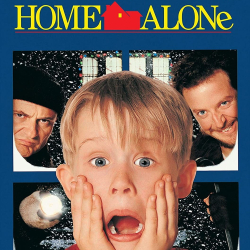There are films designed to entertain, and then there are those that become a part of our culture, living on through recitations of their lines and reenactments of their scenes. "Home Alone" undeniably falls into the latter category. It's a movie that's etched itself into the holiday season, as intrinsic as festive lights or the smell of freshly baked cookies.
I first encountered "Home Alone" during a winter much like the one depicted in the film—snow-laden rooftops and the scent of pine in the air. As a child, I was entranced by the notion of a kid hero standing alone against the world (or burglars, as it were). This film, beyond its comedic antics, stirred something deeper: a blend of independence and fantasy that captures the essence of childhood dreams and fears.
History of the Film
Released in 1990, "Home Alone" was a brainchild of John Hughes, whose work often showcased a talent for scripting the landscapes of youthful imagination and coming-of-age tales. Directed by Chris Columbus, this film formed a cornerstone of 90s family entertainment, cementing Macaulay Culkin as a household name.
The film didn't rely merely on its humorous storyline to captivate audiences; it drew from a rich tapestry of memorable characters and quick-witted dialogue that could enchant anyone from ages eight to eighty. Its reception wasn't just a flash in the pan. "Home Alone" was a colossal box office success, becoming globally renowned and followed by several sequels, albeit with varying degrees of success.
Why "Home Alone" is Interesting
The intrigue of "Home Alone" lies primarily in its premise: an eight-year-old, Kevin McCallister, left to his own devices during Christmas. There's a universal appeal to his freedom, a child's unfettered access to a world usually controlled by adults. It's an idea as exhilarating as it is terrifying, amplified by Macaulay Culkin's precocious portrayal of Kevin.
Additionally, the film merges comedy and action in a way that's rarely seen with such effectiveness. From Kevin's resourceful problem-solving to the slapstick misadventures of the burglars, there's a seamless blend of tension and laughter. This duality keeps the audience captivated, never quite sure whether to gasp or chuckle at the next scene.
My Impressions of Macaulay Culkin's Performance
Culkin’s performance as Kevin is perhaps the film's greatest asset. He embodies more than just a mischievous youth; he captures the true essence of childhood resilience and cunning ingenuity. His expressions, ranging from wide-eyed terror to smirking satisfaction, fuel the film's momentum.
Watching his interactions with the film's antagonists—a duo of less-than-brilliant burglars played by Joe Pesci and Daniel Stern—was like observing a chess match where the underdog consistently outmaneuvers his opponents. Culkin ensures that his character remains relatable and grounded despite the outlandish events surrounding him.
The Setting and Atmosphere
The setting of a suburban Chicago winter frames the story in a quintessentially warm and nostalgic Christmas atmosphere. Snow-draped streets, festively adorned homes, and bustling airports set the ideal stage for a holiday movie bound with chaos.
This sense of a once-lively home turned silent by absence not only heightens the stakes for Kevin but also serves as a crucial character in the film. The warmth of holiday cheer juxtaposes brilliantly against the mischief and tension unraveling inside the McCallister household.
The Comedy and Action
Laughter is the lifeline of "Home Alone." The film's comedic sequences often arrive unexpectedly, rendered with perfect timing. Much of this humor stems from the elaborate traps Kevin devises to thwart the burglars. These traps range from iconic to downright ingenious, blending animated slapstick with crafty setups.
The various sequences where Pesci and Stern fumble gloriously through these traps balance tension and humor perfectly. Their chemistry as a bumbling duo elevates the humor, making their failures endearing and hilarious rather than malicious or threatening.
Family Dynamics and Themes
Beneath the comedic facade lie deeper family themes. "Home Alone" is a story about dealing with feelings of negligence and the longing for familial connection. Kevin's initial freedom quickly transforms into a yearning for his family, shedding light on the importance of those bonds.
Even within the McCallister's hectic and crowded household, the individual family interactions are keenly observed, revealing relatable dynamics with an honesty that solidifies the film as more than just a comedy.
Childhood Nostalgia and Relatability
Perhaps one of the most endearing aspects of "Home Alone" is its evocation of childhood dreams and fears. The fantasy of living without restrictions is tempered by the fear of isolation, portrayed through Kevin's nightly battles with imagined creatures and his daring adventures around town.
This relatability transforms watching the film as an adult into a nostalgic experience. It's a chance to reminisce about the innocence and bravery of childhood—the times when sticking up for oneself against the odds truly felt within reach.
The Cinematic Score
A review of "Home Alone" would be incomplete without mention of John Williams' iconic score. The music is a perfect accompaniment to the film's visual storytelling, enhancing the emotional weight of scenes and stirring holiday sentiments.
The film's signature themes, both whimsical and emotive, play like a Christmas card to the viewer's ears, embedding the film further into the realm of beloved holiday classics.
Legacy and Cultural Impact
The cultural imprint left by "Home Alone" is evident in its perpetual airings during the Christmas season and its influence on holiday-themed media. It serves as a benchmark for films aiming to capture the magical balance of humor, adventure, and touching holiday spirit.
Its quotable lines and memorable moments have become a part of holiday traditions worldwide, a testament to its enduring appeal and Hughes' storytelling prowess.
The Sequel and Franchise
The success of "Home Alone" led to a series of sequels, the most notable being "Home Alone 2: Lost in New York." While sometimes diminishing in originality, these films sought to expand on Kevin's adventures, maintaining the core humor and traps that made the original beloved.
While none quite captured the novel charm of the first, their existence emphasizes the original's significant impact, warranting exploration into new settings and scenarios.
Direction and Cinematic Techniques
Chris Columbus' direction plays a pivotal role in executing Hughes' screenplay effortlessly. His ability to construct a world that maintains a delicate balance between fantasy and reality keeps the audience captivated and invested in Kevin's journey.
The techniques employed—effective pacing, dynamic angles, and clever framing—enhance both the humor and suspense, creating a seamless visual narrative that never feels trivial or superficial.
Home Alone: A Story of Innovation
The creative innovation in "Home Alone" lies not only in its humorous traps but also in its storytelling. It presents us with a young mind whose ingenuity defies adults' expectations, delighting in the joyful creativity that childhood fantasies are known for.
These innovations inspire audiences to embrace resourcefulness and imagination, a timeless lesson that resonates with audiences long after the credits roll.
The Criticisms
While immensely beloved, "Home Alone" is not without its criticisms. Some argue the implausibility of events detracts from the film's substance, expecting a level of real-world logic that the film deliberately eschews.
However, such critiques often overlook the film's intention: to entertain, to inspire wonder, and to evoke feelings beyond conventional realism, serving as a celebration of the robust spirit and creativity of youth.
Conclusion
At its heart, "Home Alone" is a film that skillfully captures the magic of ingenuity and the warmth of family with humor and heart, framed within a delightful holiday setting. It invites viewers to suspend reality, indulging in the fantastical escapades of Kevin McCallister with unabashed joy.
For me, "Home Alone" transcends its comedic exterior to become a beloved nostalgic reminder of childhood courage and the enduring importance of family bonds. Decades on, it continues to entertain, inspire, and resonate—a testament to the enduring allure of a timeless holiday classic.
Screenshots
To download the app, you will get links to the Official Website and/or official digital markets.











